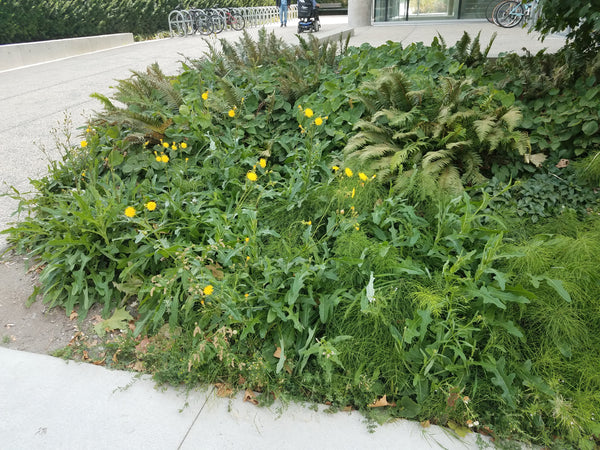
On Urban Food Commons
If all of the lawns in America were combined they would cover roughly all of Greece. If this is a bit abstract think Nevada plus Massachusetts. If that is still too abstract: they cover more land than all cropland in the United States combined.
This is remarkable and beautiful. Lawns are deeply intertwined with every moment of our lives: the sites of playing games, lazing in the sun, picnicking, rolling down hills and watching the world go by. We are all collectively cultivating a vast expanse of rolling green livingness for free use and beauty.
Lawns are also a huge problem -- this area the size of Greece is a massive site of poisoning -- herbicides, pesticides, and fertilizers are sprayed, poured and dosed all year. The collective Greece-sized-lawn is perhaps our single biggest toxic dump.

It is also a site of great possibility: we are as a community caring and nurturing a huge ecosystem supporting a diverse world of creatures. This is what we want to focus on: as collective cultivators of a vast ecosystem what else could this become?
There are already many proposals for what we should do with the lawn -- from native species gardens to community gardens and small farms. While these are all good initiatives, what all of these do is seek to remove and replace the existing ecosystem. You are asked to tear up and toss out one ecosystem, which is considered not worthy of existing, and replace it with one more worthy. But how does this really foster an ecological mindset? The replacement mindset is not one of cultivating, caring, nurturing and co-evolving. We keep dumping elsewhere what we don’t want here, but the poison finds its way back to us. We need to care for our problems.
What is most wonderful about lawns is that if you just let them grow they will transform in remarkable ways: all those plants we call “weeds” will emerge. What are these weeds? In reality, they are a whole set of plants that we humans have relied upon for millennia but now have little need for.
By doing nothing we allow an edible meadow to emerge. As everything begins to grow over the year different plants will ready to be foraged. Wild onions in early spring, then chickweed and dandelion, curly dock and lambs quarter, strawberries as summer peaks, then mushrooms in fall. By doing nothing you have allowed a vast urban food commons to emerge.
As the meadow grasses grow tall they will put down deep roots, holding and making soil. Their root system will begin to sequester vast amounts of carbon and detoxify the soils. Insects and fungi will join this complex activity of eating and transforming. They too are foraging the food commons. Birds will come to nest and feed. Foxes return. Milkweed and pokeweed will grow tall beckoning monarch butterflies and others.
Need a patch for a picnic? Lay stones or cut a patch. Compost what you cut. It is a flexible and resilient meadow.
Worried about mosquitos? Keep standing water drained or have fish. House bats and birds. Plant eucalyptus and use the oil -- far more effective than DEET.
Worried about deer ticks? Welcome foxes and other small predators they effectively interrupt the tick breeding cycle. Wear long-sleeved clothing and check yourself. Change your habits.
Neighbors unhappy? Do things step by step -- remember you are cultivating new sensibilities and forms of beauty -- this won’t happen at once. Bring them into the process. Work with your community.
Don’t have a lawn? Grass is everywhere -- public fields, along highways, sidewalk edges, medians. Help shape these. Treat all of your neighborhood as a commons.
Your town might consider this spontaneously growing meadow “blight”. This is a problem. Work with others to change these bylaws -- they only promote the poisoning of you, your family and the whole environment in the name of an impoverished idea of beauty.
Why call this a “food commons”? Eating and food is both what all living things do and are. To say food is to draw out attention to this intradependency. Food and eating is everything and everywhere -- for all of our health -- across all species -- we need to care for all food and eating. Food is not a product found in stores or grown specifically on a farm, it is all living things everywhere and at all times. Commons -- is a wonderful old word for a way of keeping the world shared and interdependent. Our ecological world is common to all species. It makes very little sense to call some piece of the world mine. By letting our lawns grow we are making common -- commoning a new world into being.
One last word: foraging. This is how all of us engage with each other and the world. As lawns become food commons we care for them and keep them common via foraging. Community emerges, guidelines develop, care and mutual aid is fostered (between and across species).
So, let’s start by doing nothing -- let others live and thrive, then interact with them and build mutual dependencies. Take it slow, we need to change as our environments change. Care and nurture your new sensibilities, habits and shared environments. Long live the urban food commons.

Leave a comment